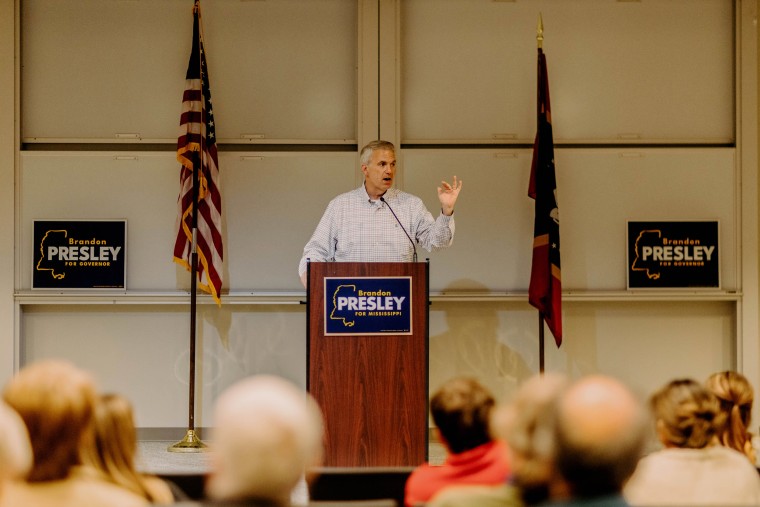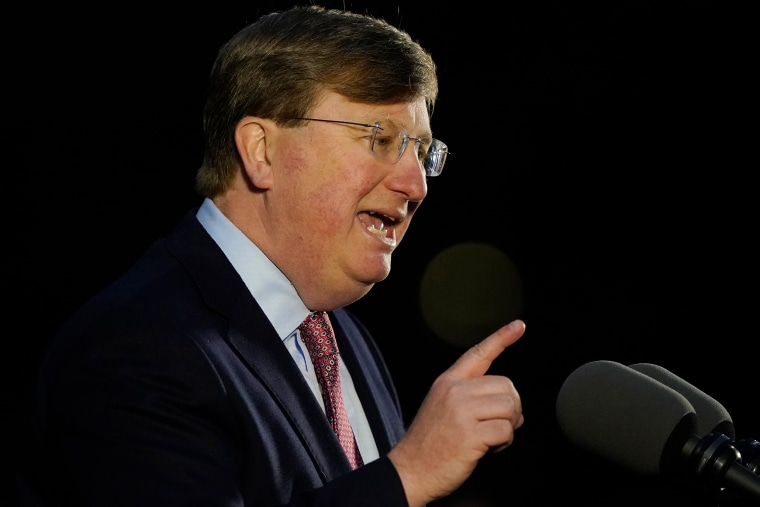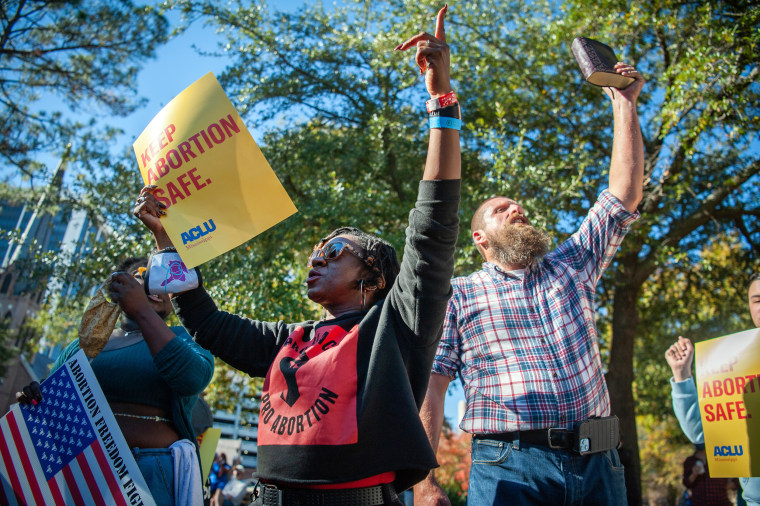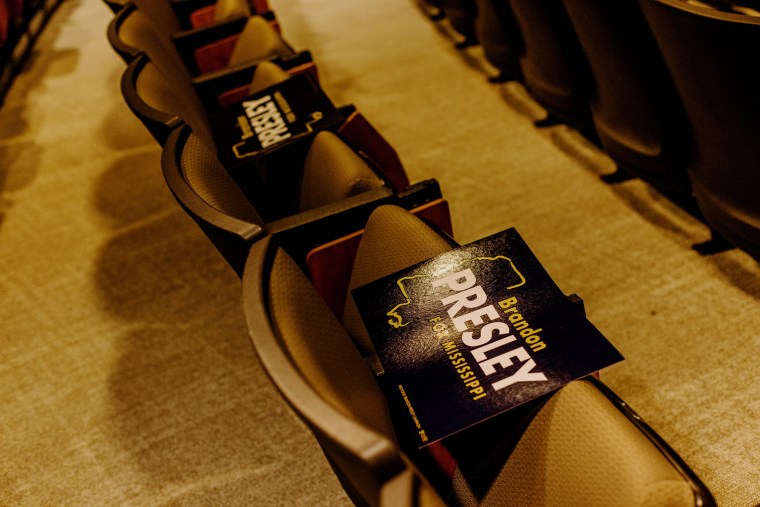Mississippi Democrats wrestle with backing ‘pro-life’ Brandon Presley for governor

[ad_1]
OXFORD, Miss. — In Mississippi’s first gubernatorial election since the fall of Roe v. Wade’s — which shuttered clinics across the South and drove pregnant women across state lines for care — abortion rights aren’t on the ballot.
Republican Gov. Tate Reeves and his Democratic challenger, Brandon Presley, both support the state’s sweeping abortion ban.
That has left some Democratic voters here wrestling with deeply held convictions about abortion rights in a surprisingly competitive governor’s race: Should they support Presley’s “pro-life” campaign, which promises to provide a desperately needed lift for vulnerable families? Or should they withhold their vote in protest, which could help Reeves, a conservative incumbent who critics say hasn’t done enough to address some of the state’s most persistent socioeconomic challenges, win a second term?
Lovie West, president of the Mississippi Federation of Democratic Women, which helps women run for office, concluded that there was too much at stake for her to be a single-issue voter.
“I would not support anyone who did not support Roe v. Wade,” she remembers thinking after the Supreme Court’s decision. But she said there are other “woes” facing Mississippi apart from abortion restrictions, from an infant mortality crisis to struggling schools. “When you look at the picture again,” she continued, “it doesn’t make sense to cut off my nose to spite my face.”
In more than a dozen interviews, including with attendees at Presley campaign events, Democratic strategists and reproductive justice and civil rights advocates, abortion rights supporters largely said they’re willing to vote for Presley because they believe the nation’s poorest state would benefit from a governor who supports expanding Medicaid and better funding public schools.

Presley’s aim of making Medicaid available to more than 220,000 Mississippians is broadly popular — 72% of likely voters support it, a recent poll found — and could draw Republicans who wouldn’t typically back a Democrat. But Presley’s opposition to abortion rights could also dampen the enthusiasm of progressive voters in a race where turnout is critical.
Marvin King, a political science professor at the University of Mississippi, said Presley’s anti-abortion-rights messaging carries some risk, if even 2% of the electorate he needs stays home. The state’s last governor’s race was decided by 5 percentage points, and the limited polls ahead of next week’s election indicate that Presley may have a rare shot at unseating an incumbent with low approval ratings in a reliably red state.
“At the end of the day, no Democrat can win unless you get really, really high turnout from your base,” King said. “And if your base is mostly pro-choice, and you’re pro-life, you’re kind of playing with fire.”
Presley, who is kin to Elvis Presley and has long represented northern Mississippi on the state’s public service commission, says his views on abortion are drawn from his strong religious beliefs. He has framed his candidacy as “pro-life” as a way of drawing attention to broader health care issues in the state, which has some of the poorest outcomes in the country.
“Being pro-life is more than just the abortion issue,” Presley told WJTV in June. “Look, I’m pro-hospital. I’m pro-doctor. I’m pro-ambulance. I’m pro-emergency room. This governor is anti-every one of those things.”
A recent report warned that 30% percent of Mississippi’s rural hospitals are at “immediate risk” of closing. The state’s medical and hospital associations have said spurning Medicaid expansion often means hospitals won’t be reimbursed when caring for patients who lack insurance — many Mississippians are employed in low-paying jobs that don’t provide health coverage — and that those financial losses make it harder for hospitals to stay open in a state where some residents already face long drives to reach an emergency room.
A representative for Reeves did not respond to requests for comment. The governor has opposed expanding Medicaid, criticizing it as “welfare.” This fall, he announced a plan that his administration said would send nearly $700 million to the state’s struggling hospitals, but the proposal won’t provide health coverage to the uninsured. On the campaign trail, he has touted the state’s educational gains, new jobs brought by major economic development projects and low unemployment levels.

Reeves, who recently received former President Donald Trump’s endorsement, is trying to keep up his party’s winning streak — Republicans have held the governor’s mansion for two decades and have captured a majority of the state Legislature since 2011. Presley is trying to break this grip and has drawn support from U.S. Rep. Bennie Thompson, the most prominent Democratic official in the state, as well as Morgan Freeman, who grew up in Mississippi, and author John Grisham.
While Presley trailed Reeves in a recent Magnolia Tribune/Mason–Dixon poll, he has surpassed the governor’s campaign donations by more than $5 million this year, including a more than $5.8 million boost from the Democratic Governors Association. The group has previously praised Democratic governors’ fight for abortion access as “a winning strategy,” but it does not take policy positions and has also backed other Democrats with similar anti-abortion positions, including Gov. John Bel Edwards of Louisiana.
“The DGA’s job is to support our governors and nominees chosen by the voters — not set the agenda for individual states,” Izzi Levy, a spokesperson, said in a statement.
Not all progressive voters in the state are willing to compromise.
Michelle Colón, the executive director of abortion rights group SHERo Mississippi, speaking in a personal capacity, said she wants Presley to win because of his support for Medicaid expansion, but she is not voting for him. She argues that abortion care can’t be separated from other health care issues.
“I want a better Mississippi. I do. But that better Mississippi includes all Mississippians,” she said. “I don’t want a little piece anymore. I want my plate to be full. I want all Mississippians’ plates to be full. I’m tired of crumbs.”

The conservative view that alienated Colón could help Presley gain some voters on the right. Chip Wood, a Republican alderman in the northern Mississippi town of Corinth, endorsed Presley in a television ad with several other party members this fall.
“If he was a pro-choice, take-your-guns-away guy, he wouldn’t have the support of those folks,” Wood said of Republican voters backing Presley.
Wood believes that in addition to Medicaid expansion, another factor winning over those voters is Presley’s pledge to clean up corruption, following a scandal over what the state auditor’s office has said is the misuse of at least $77 million in federal funds meant to aid the state’s poorest residents. Presley has accused Reeves of having connections to those at the center of the case, both in an attack ad and at the pair’s sole debate this week, while Reeves has argued that the problems occurred before he became governor and had nothing to do with him.

As the campaign season ramped up this fall, Presley appeared at football tailgates at historically Black colleges and universities, where he courted Black voters, who are a critical part of the coalition he needs to unseat Reeves.
During a nonpartisan NAACP effort to increase Black voter turnout this year, the issues that canvassers heard about most were health care, jobs and education, said Charles Taylor, the executive director of the Mississippi state conference of the NAACP. The group doesn’t endorse candidates, but Taylor sees the election as a referendum on the state’s health care crisis and Medicaid expansion.
“This election is not about political wins or losses,” he said. “It is about the lives of Mississippians.”
While voters won’t be able to express a view on abortion through their gubernatorial choice, there is a difference of opinion in the state attorney general’s race, where Democratic nominee Greta Kemp Martin, who supports abortion rights, is challenging Republican Lynn Fitch, whose office argued the Dobbs v. Jackson Women’s Health Organizations case before the Supreme Court.
Susan Fino, a retired educator, said she will vote for Kemp Martin. She’s also decided, after careful consideration, to back Presley. Two summers ago, as she heard buzz of Presley’s possible gubernatorial campaign, she wrestled with whether to support the likely Democratic nominee, in part because of her concerns about his anti-abortion views.
Fino discussed the question with a group of her friends, who call themselves the “Wise Women” and often have lunch and talk politics in Oxford, a northern Mississippi college town.
West, of the state Federation of Democratic Women, came to speak to the group. Fino, who is white, thought it was important to listen to the perspective of West, a Black woman. West argued that they needed to be practical and focus on what a candidate could accomplish, even if they didn’t align on every issue.
Fino said West’s stance cemented her vote for Presley.
“We have to look at it, take what we have,” she said, while awaiting Presley at a recent campaign rally in Oxford, “and hope that if he’s pro-life, he’ll make life better for those who need help.”

[ad_2]
Source link
